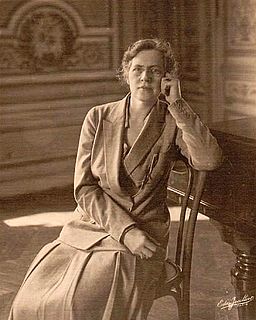A Quote by William James
Our colleges ought to have lit up in us a lasting relish for a better kind of man, a loss of appetite for mediocrities.
Related Quotes
Nothing is better than music; when it takes us out of time, it has done more for us than we have the right to hope for: it has broadened the limits of our sorrowful life, it has lit up the sweetness of our hours of happiness by effacing the pettinesses that diminish us, bringing us back pure and new to what was, what will be, what music has created for us.
Our ego ideal is precious to us because it repairs a loss of our earlier childhood, the loss of our image of self as perfect and whole, the loss of a major portion of our infantile, limitless, ain't-I-wonderful narcissism which we had to give up in the face of compelling reality. Modified and reshaped into ethical goals and moral standards and a vision of what at our finest we might be, our dream of perfection lives on--our lost narcissism lives on--in our ego ideal.
Phury lit a blunt and eyed the sixteen cans of Aqua Net that were lined up on Butch and V's coffee table. "What's doing with the hair spray? You boys going drag on us?" Butch held up the lenght of PVC pipe he was punching a hole in. "Potato launcher, my man. Big fun." "Excuse me ?" "Didn't you ever go to summer camp ?" "Basket weaving and woodcarving are for humans. No offense, but we have better things to teach our youngs.
In a word, acts of any kind produce habits or characters of the same kind. Hence we ought to make sure that our acts are of a certain kind; for the resulting character varies as they vary. It makes no small difference, therefore, whether a man be trained in his youth up in this way or that, but a great difference, or rather all the difference.
It's time we put thoughts of lack behind us. It's time for us to discover the secrets of the stars, to sail to an uncharted land, to open up a new heaven where our spirits can soar. But first we'll have to make changes. And lasting change does not happen overnight. Lasting change happens in infinitesimal increments: a day, an hour, a minute, a heartbeat at a time...
The commandment of God is, that we love Our Lord in all our heart, in all our soul, in all our thought. In all our heart; that is, in all our understanding without erring. In all our soul; that is, in all our will without gainsaying. In all our their ought; that is, that we think on Him without forgetting. In this manner is very love and true, that is work of man's will. For love is a willful stirring of our thoughts unto God, so that it receive nothing that is against the love of Jesus Christ, and therewith that it be lasting in sweetness of devotion; and that is the perfection of this life.
Adversity is a severe instructor, set over us by one who knows us better than we do ourselves, as he loves us better too. He that wrestles with us strengthens our nerves and sharpens our skill. Our antagonist is our helper. This conflict with difficulty makes us acquainted with our object, and compels us to consider it in all its relations. It will not suffer us to be superficial.
By whatever means it is accomplished, the prime business of a play is to arouse the passions of its audience so that by the route of passion may be opened up new relationships between a man and men, and between men and Man. Drama is akin to the other inventions of man in that it ought to help us to know more, and not merely to spend our feelings.







































